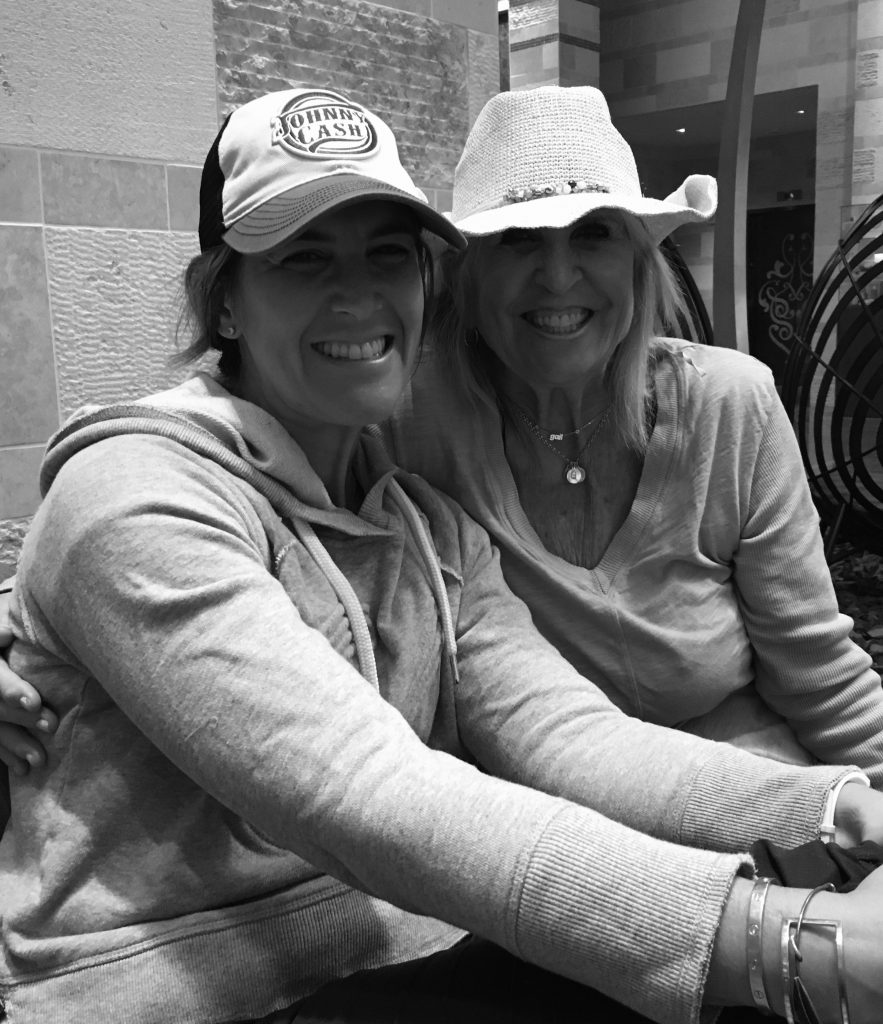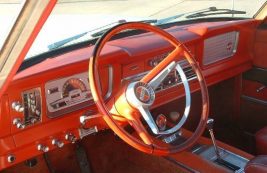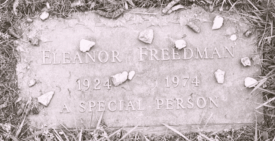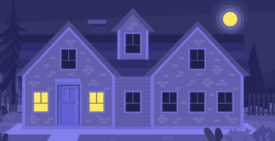
Mom “always loved a Jeep.” (Wikimedia Commons)
I swept out the garage quickly the day my mother arrived from Florida. We were in a hurry to get a second opinion about the pain she was having. I didn’t want her to be distracted by my mess, didn’t want her to be mad about it. We had to focus. But in my rush to get the airport, I never got a chance to sweep the pile into a garbage bag. So it stayed there all summer in between the cars, but on the driver’s side so she never knew the pile was there. She just saw the swept part.
Weeks went by, and then on the day we went for a cardio workup, she slipped on the last stair down to the garage, and I found her sitting on the floor near the pile. She was in one piece but rattled, sitting in my mess the way we have sat in each other’s messes my whole life long. The rest of the summer her back hurt, and she said it was from that fall but now I think it was cancer. This whole time was cancer. We got distracted by a differential diagnosis, by having to take out the dog, by hosting guests in the backyard, by summer camp visiting day, tennis matches, the lawn turning yellow.
A person is a world. I read this recently and it stuck. Usually, there is something generic about the way we talk about loss that I find agitating and this is because loss is specific. The most specific thing that can happen to a person. The person who died and the person who lived. In the year since my mother died, every time I go out for a walk near my house I pass by a black, Maxell cassette tape in a bed of nature-y detritus. Dirt, leaves, mud, shade. Depends on the season. Near the end of a tumultuous relationship my senior year of high school, a boyfriend made me a mixtape that was meant to be a timeline of our love. It was a witty guy thing to do, thoughtfully recording and playing back songs that might match up with the real things we felt and did. But it was interesting mainly because I got to see us through his eyes and not mine. Here is us as we were. This is what a mixtape always was, a world — a time capsule of summer camp, the town pool, of junior high, of that one week when everyone loved Yaz.
My maternal grandmother used to say to my brother and me over a bowl of spaghetti and too old meat sauce that she had insisted on defrosting for us, pick my brain. She wanted us to ask about how she got here — by land or by boat type questions. Lineage things. But I already knew what I wanted to know. That her father was a kosher butcher whose authority she resented, turning her into a person who lit up a cigarette on Shabbat as a rebellion. She loved crab cakes and salted peanuts and Victor Borge and William Safire. She never went to college despite having the vast mind for it.
She was the stubborn middle child of seven. She had long legs and a short temper. One of her sisters would grow up to own a knitting store and she came to be a person whose wardrobe was made up entirely of knitwear of her own crafting. Sporting a knee-length cable-knit skirt and orthopedic shoes to a milestone birthday party during my childhood, she was a cozy houseplant of a person, soft to touch, buttoned into her own clothes like a teddy bear. I don’t remember all the rest of them but I do remember that sister and another one whose name was Rose and who was sweeter and more charming than my grandmother, and I thought I would like to name a person Rose because of her.
I have flimsy but bright memories, a whole mixtape’s worth, of these women and other relatives, too — generations once removed, friends of friends, people who flitted in and out of my life in the bubble bursts of the percolator brewing coffee at life cycle events. Of these same people, someone else closer to them has days of memories — smells and looks and outfits and squeezes and winces and meals. None of this matters specifically. We tell each other these stories because they connect us to something besides the here and now, grounding us in the solid earth of the big and long enough lives lived that came before us, and then we sweep it all into a neat pile in the garage that we forget to throw away because we have things to do.
Very late in my grandmother’s life my daughter would play with the drapey crepe of her skin in the social room of an assisted living facility in Florida where she had recently thrown something at a nurse and scowled at my mother. She smiled at the 2-year-old before her, though. She had a soft spot for babies and my baby had a soft spot for her. When I was 11, she had come to my rescue when I skinned my leg on after falling off my 10-speed in a far off neighborhood. I have a scar on my knee from where she had dug out the gravel but not quite all of it, while I sat on the closed lid of the toilet of my childhood powder room. She will be a part of me for as long as I am here. We were close. I understood her. I had seen her cry and yell and laugh and do a crossword with a mini-golf-sized pencil. I had watched her stir her drink and lean back in her recliner and drift off while I ate spearmint leaf chewy candies and watched “Jeopardy!” I had the inside scoop. She was a self-made woman with an eating disorder and a drinking problem and she said the same things over and over trying to make them right. She’s always putting the cart before the horse, she said about my mother time and again.
And so, 12 years and 13 days after I lost my crinkly grandmother, I lost my mother, the horse dragger.
It is awful and sad and shocking that she is gone.
Before this virus hunkered us down, I went on, as we do. I drove carpools and paid bills and went to meetings and ate lunch standing up in my kitchen. Since she died, I have shopped for a pair of pants my 13-year-old might wear to a bar mitzvah. I have danced a hora since she died. I have sung along to Def Leppard since she died. I have sat on her bed and cried and sprayed her perfume all over me since she died. But there is this slipping away that happens as I move forward, that kicks me in the gut when it washes over me. Would she have liked ‘Fleabag’ as much as I did? A month ago I would have known. My grip on the world I inhabited with her is loosening and I am breaking in half over it. Why can’t I reach back and get to it? Why can’t I reach back and hold onto her slippery shoulders in the pool of the Vantage Point swimming pool in 1982 and say, take me on a whale ride?
It’s all slippery now.
Would she have liked ‘Fleabag’ as much as I did? Not long ago, I would have known.
I was once tethered to her by telephone. I was tethered to this earth by her. Taking off! Landing! On way home from the grocery store. Waiting for kid at tennis, have to dry my hair, call you in 5 minutes when I go to Brooklyn. Taking a break from writing, calling you now. Show me your haircut. Show me your new patio cushions, show me the rain, show me your salad, your table, your face, show me.
She always liked a Jeep, my college boyfriend said when he heard the news. And then he texted me a picture of the leather money clip she had gotten him for graduation. It’s been 22 years since that day, and he carries it still. She drove a Jeep until the day she died. People carry each other around in this way.

Beth and her mom (Courtesy of Beth Ain)
I tally up her likes now as I go about my days, to keep her close. A mixtape. She liked Golden Grahams, steak on the grill, taco salad and chicken livers and supermarket birthday cake. She loved TV and the news and awards shows. She loved “CSI” and Roger Federer. She loved mountains and birds. She loved her father and hats on other people. She loved Duke basketball and eating at the bar. She loved Cartier watches. She loved Sabrett’s hot dogs. She loved Paul Anka and used to scream in the back seat of her father’s Lincoln Continental when he sang on the radio, somebody help me, help me please.
She said we would be quoting her long after she died. She laughed when she said this. She laughed and laughed and laughed.
The moment she was gone, I was nostalgic for the moment just before, the part where she was breathing and we were singing “Devoted to You” by the Everly Brothers, which was the only song we could think to play as her blood pressure dropped and I rubbed my fingers over her knuckles so I would never forget what they felt like. I wanted to rewind back to that hike in Arizona, years and years ago, when we got lost and it was very quiet and eery, and she yelled out Ricola! at the top of her lungs and I bent over in half laughing and then we collected ourselves and found our way out. Other moms wore bikinis and dry ponytails at the Vantage Point pool. They were fit and smiling and one of them attended to me in her bikini when I stepped on a bee near her lounge chair. My mom had a wet head from dunking us, and mascara smeared around her tan face. She wore a strapless one-piece. She was fatter than the other moms because she liked Tastycakes and her own cooking and watching “The Love Boat” while tickling my back.
But now a hurting where there once was tickling, the same searing hurt you feel when you bang your head on the frame of your car door when you are in a hurry. That’s it. Grief is a quiet, sobbing injury you experience alone, sitting in your garage, late for something and humiliated, your body pulsing with whiplash and regret and a stinging scalp, burning eyes, gulping rage.
During shiva, I watched my brother pour himself three fingers of bourbon into one of my grandmother’s rocks glasses and then half a bottle more each day and I thought well isn’t this just the worst.
If a person is a world, a family is a universe, and so, in my mother’s wake, a black hole. A big bang. No matter how it looks on the outside to the scientists, it feels like something else to the star.
I once saw an episode of a hospital drama where a woman with Alzheimer’s has to be told over and over again that her son has died. It was a terrible thing watching her face crumble every time. But it was a brilliant episode really because that is what grief is, having to wake up every day and discover that a piece of you is gone and then having to bear it all over again. It is a chronic banging of your head on the car-door frame.
My mother was too young and it was too sudden and she might as well have gotten hit by a goddamn train and for a while I hated everyone whose mother was alive and happy and playing tennis and getting their nails done and going on safari in Africa and blowing out sparkler candles at fancy restaurants. Loss is an inside thing that we carry around like knee-pain, a low-grade ache that keeps on aching even as we dance at parties. For that, my mother, a physical therapist to her last breath, would have told me to lose 10 pounds and the knee pain would be gone. What about for this?
In my mother’s wake, a black hole. No matter how it looks on the outside to the scientists, it feels like something else to the star.
A pandemic maybe. So that the world might be still with me for a minute. And so it was. We were all still. Early on in the quarantine, I went upstairs to her room to get my mother’s Kindle. It was a strange moment in time when the only way I could get a new book to read quickly was to do this thing I had never done.
I had been thinking that I would buy “Writers and Lovers,” because two of my favorite readers recommended it to me at once, and because I love Lily King. However, in order to do this, I would have to reset the device and connect it to my account, which is to say, my mother’s books would be gone. Therefore, I could not read Lily King’s new book, which was fine because it is a book about mother loss and as of yet, I have not been able to tolerate this topic. I have taken to reading the books on her Kindle instead. There will be time on the other side of all of this to read the other things, but G-d willing, there will never be this pause again, this strange and still and endless space in which to read someone else’s Kindle start to finish.
For now, we are all grieving something — the loss of a paycheck, a school day, a grandparent, a neighbor, our health, our safety, John Prine, John Lewis, a chaotic woman with a Kindle library a mile long. This right now is what the end of something feels like, and we’re all feeling it together, at once, that reel to reel of the cassette tape. That end of a world, that beginning of another.
Beth Ain is the author of eight books for children and young adults, including “Izzy Kline Has Butterflies” and “The Cure for Cold Feet” (Random House), and the “Starring Jules” series (Scholastic). Her essays have appeared in Kveller, Dame, and Scary Mommy, and she has just finished her first novel for adults, “Cactus People,” inspired, as with everything else she writes, by her real life.








